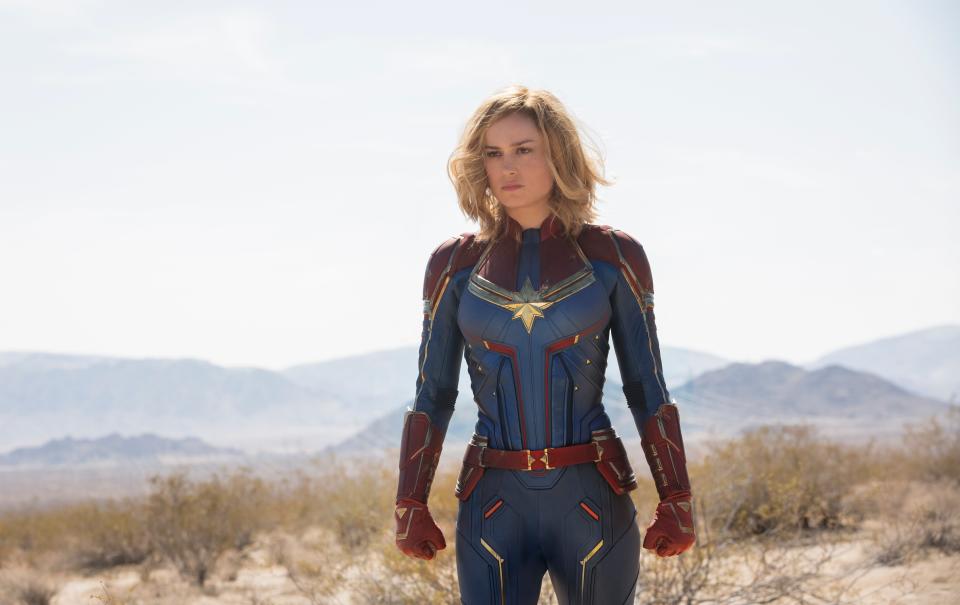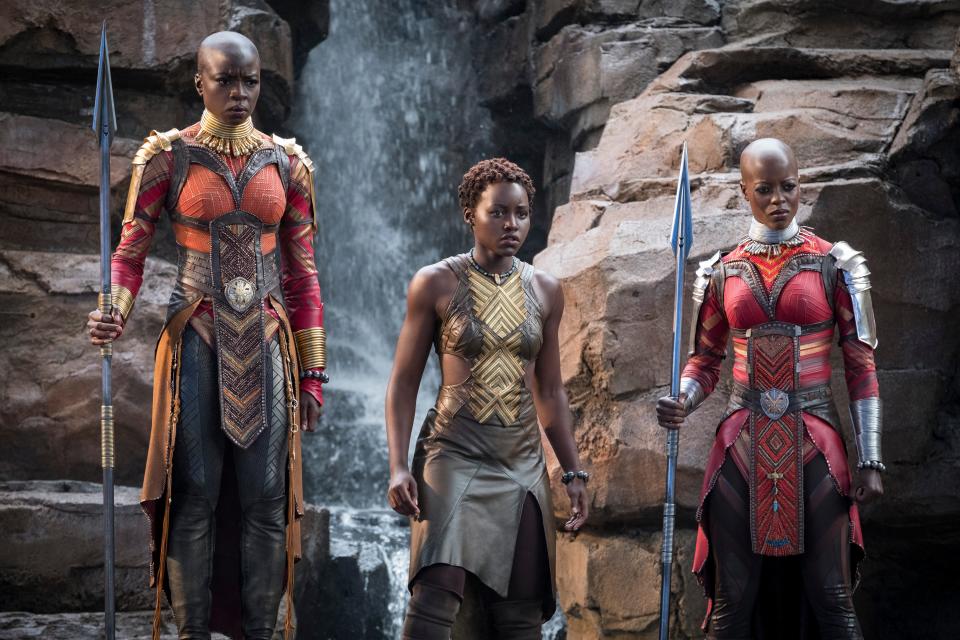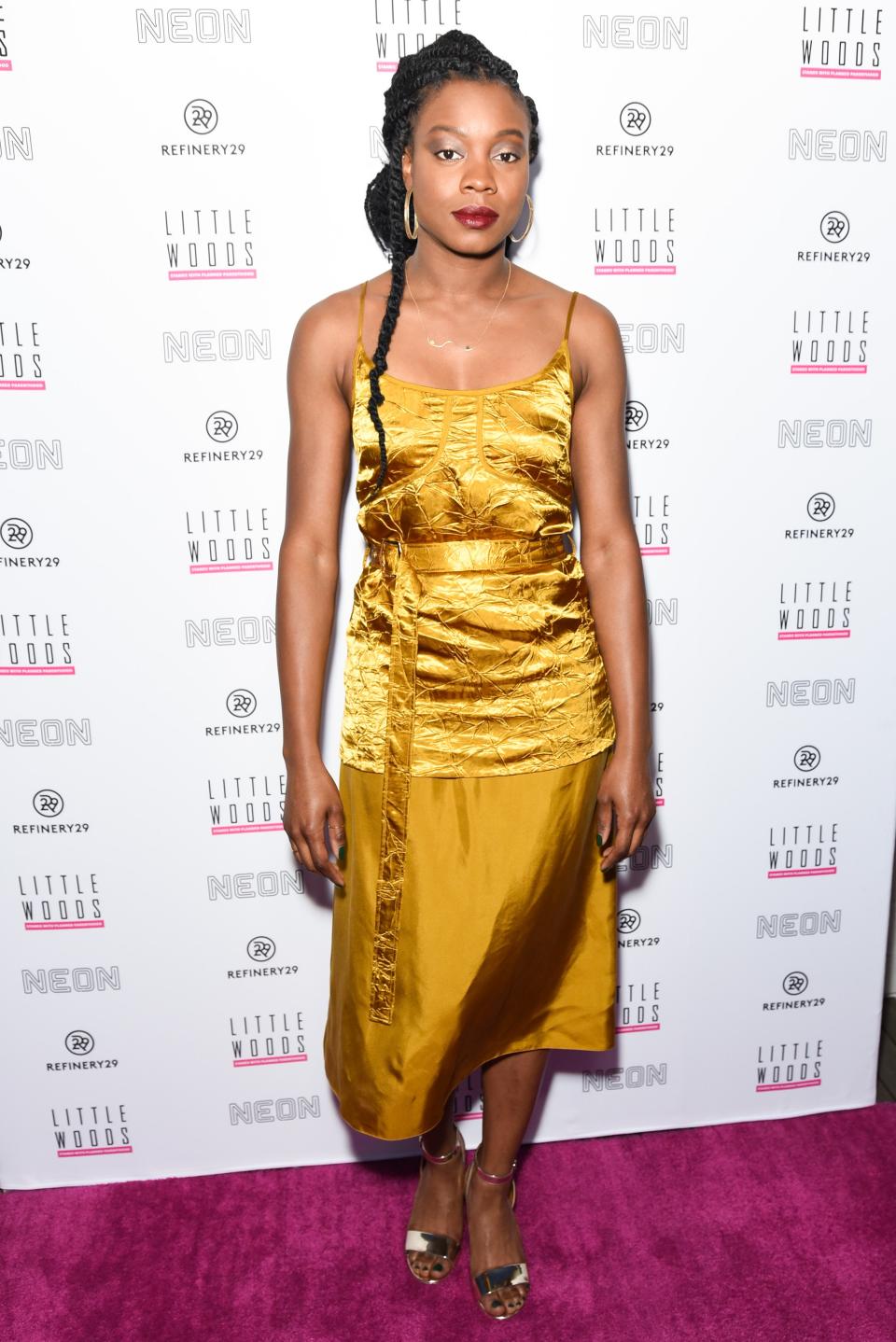Black Widow and beyond: The women taking on the boys’ club of superhero movies

When Scarlett Johansson’s Black Widow, aka Natasha Romanoff, makes her first film appearance in Iron Man 2, she’s introduced to Robert Downey Jr’s Tony Stark by his assistant Pepper Potts (Gwyneth Paltrow) as “potentially a very expensive sexual harassment lawsuit.” Stark responds by scouring the internet for some awkwardly staged photos of Romanoff in her underwear, before declaring “I want one.”
Let’s just say the scene hasn’t aged well. “You look back at [the film] and while it was really fun… the character is so sexualised,” Johansson said recently. “Really talked about… like a piece of ass, really.” 11 years later, Black Widow is finally getting the spin-off movie she deserves, helmed by Cate Shortland. The Australian filmmaker is the first woman to direct a Marvel movie solo (note that the superhero studio has so far released 23 films).
A prequel for 2018’s Infinity War, the film sees an initially reluctant Romanoff, so often the token woman on screen, joined by adoptive sister Yelena (Florence Pugh) and mother Melina (Rachel Weisz) to take on the man who brainwashed them, forcibly sterilised them and then put them to work as child assassins. If that sounds gloomy, it’s actually a joy to see them land punches and volley insults (sometimes at each other). In its opening weekend, it is estimated to have made more than $215 million internationally ($60 million of which came from its release on Disney+ Premier Access) and its release marked the largest US box office opening since the start of the pandemic.

In the decade or so since Black Widow became the MCU’s first major female character, things have come on (gravity-defying) leaps and bounds for women superheroes on screen. The past few years have seen both Marvel and its rival studio DC launch acclaimed standalone films for Gal Gadot’s Wonder Woman, Brie Larson’s Captain Marvel and Margot Robbie’s Harley Quinn (2020’s Birds of Prey), with more in the works.
Yet for a long time, it was film industry gospel that such movies simply didn’t shift tickets. One email exchange revealed in the 2014 Sony email hack saw Marvel’s then-CEO Ike Perlmutter spell out his disdain for such projects, appearing to rule out developing superheroine star vehicles by citing flops like Catwoman (“a disaster”) and Elektra (“very, very bad”).

Naturally, there was a double standard at work. One bad box office performance for a male superhero - say, Ben Affleck as Daredevil in 2003 - didn’t make execs abandon the genre altogether: if anything, they doubled down, learning from past mistakes to establish the first phase of the MCU. But after the failure of the critically mauled Elektra, it took 12 years for another female-led superhero film to come around and challenge perceptions.
Watch: 'Black Widow' star O-T Fagbenle discusses his MCU future
That movie, of course, was 2017’s Wonder Woman, directed by Patti Jenkins. Speaking shortly before its debut, Jenkins alluded to how that same double standard can play out behind the camera. If a man screwed up an expensive blockbuster, she suggested, “it will just be yet another mistake that the studio made. But with me, it’s going to look like I dropped the ball, and it’s going to send a very bad message,” potentially doing “a big disservice” to women in her industry.

Jenkins’ film ended up wildly exceeding box office projections, earning more than $800 million worldwide and becoming the highest-grossing film directed by a woman - until Captain Marvel, directed by Anna Boden with Ryan Fleck, broke its record in 2019 (it has since been knocked off the top spot by Frozen II).
Money talks, and these financial success stories almost certainly helped green light Black Widow’s solo project, as well as prompting a flurry of new comic book movies and series based on women characters. Gadot and Jenkins reunited for Wonder Woman 1984 last year and are set to make a third film. After she stole scenes in 2018’s Black Panther, a spin-off series for Danai Gurira’s Okoye, leader of Wakanda’s formidable Dora Milaje warriors, is rumoured to be in the works. And later this year, Marvel’s first Muslim superhero Kamala Khan, aka Ms Marvel (played by Iman Vellani), will get her own Disney+ show, too, joining She-Hulk and a female-led Hawkeye reboot on the streaming platform’s packed slate.

The studios are finally making (small) strides in addressing the gender imbalance behind the scenes, too. Nia DaCosta will lead Captain Marvel sequel The Marvels, becoming the first black woman to direct a Marvel movie, while Nomadland’s Chloe Zhao will follow up her historic Oscar wins with the release of Eternals in November. Promising Young Woman director Emerald Fennell is writing a DC film about sorceress Zatanna, and Booksmart’s Olivia Wilde is thought to be developing a Spider-Woman standalone project.

Progress comes in fits and starts, though, and a few women’s names above the line can sometimes act as a smoke screen. Speaking to The Guardian, Shortland described the “incredibly gendered” set at Pinewood Studios in London, where she and Johansson would be the only women working alongside “200 or 300 men.” The Argentinian director Lucretia Martel, meanwhile, claims she was approached about Black Widow, only for Marvel to suggest that she would not have to worry about its action scenes.
Her allegations are disappointing, not least because the recent spate of female-led comic book films have featured some truly staggering sequences: just think of Wonder Woman striding across no man’s land. There’s also something quite radical about seeing women at the centre of action set-pieces, rather than loitering on the sidelines. As Robbie, whose production company developed Birds of Prey and has since launched a screenwriting programme for women working on action films, put it in her recent Vogue interview: “Those scenes where everything’s exploding around you, and you make it just in time, those epic war hero runs... Girls never get those.” Until now.
What does a predominantly female-made superhero movie look like? There’s no one simple answer, of course, but the male gaze is happily MIA. In the earlier Avengers films, the camera had a leery habit of lingering on Johansson’s bum; Shortland, meanwhile, was intent on stripping back that sexualisation. “I really fought to start Black Widow where she’s by herself, because then you’re not seeing her in relation to anyone else,” she said recently.

Costumes are important, too: just look at the difference between the armour worn by Wonder Woman’s Amazon counterparts in Jenkins’ standalone movies, designed to reflect authentic ancient Greek armour, versus the glorified leather bikinis they wear in Justice League. Natasha and Yelena’s outfits are form-fitting but functional; there’s a brilliant comic refrain about the latter’s obsession with an unassuming black utility vest, the first piece of clothing she’s ever bought for herself. She rhapsodises gleefully about its many pockets, how practical it is, how comfortable she feels in it.
Indeed, Pugh’s character feels like a sign of things to come. She has no patience with her sister’s hyper-feminised pre-fight stance, cheerily mocking her as a “poser.” If she’s the future of superhero films then we’re surely in good hands. A generation of young filmgoers are about to grow up seeing female characters that are much more than just sex objects, victims or ciphers, but actual (super)human women.
Black Widow is in cinemas or order it on Disney+ with Premier Access Disney+ subscription and additional fee required for Premier Access
Watch: 'Black Widow' star O-T Fagbenle discusses his MCU future
Read More
O-T Fagbenle: I turned down the Black Widow audition first time around
Black Widow: A wondrous, hilarious goodbye to Natasha Romanov
MTV Movie & TV Awards: Scarlett Johansson slimed by husband Colin Jost

 Yahoo Movies
Yahoo Movies 